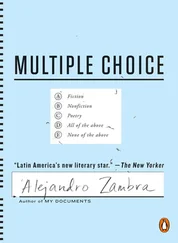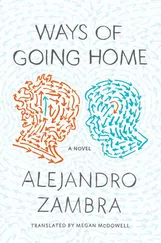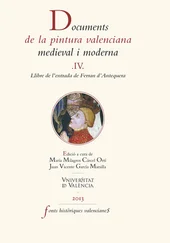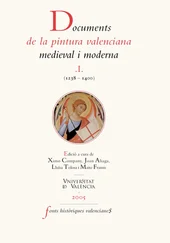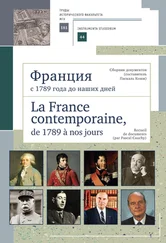Now he’s driving, nervously: it’s Friday, and tomorrow he has to go to a wedding as Paz’s date. She asked him if they could take the car, so now he has only one day to practice — he has to seem like a seasoned driver, or at least he has to obey the traffic laws. At first it all goes well. He stalls at a red light, as he tends to do, but he has some courage in reserve, and, for a little bit, he achieves a certain fluidity. Then he gets carried away and decides to go to the mall to buy two plates and three cups to replace the ones that he’s broken, but he’s unable to change lanes at the right time, or move ahead of the other cars, and he gets stuck in his lane for ten minutes, until the exits run out. Now he’s headed southward on the highway, and there’s nothing to do but attempt a U-turn.
He pulls over onto the median and decides to wait until he calms down. He turns off the radio and bides his time until he can make the turn, but, when the opening comes, the car stalls again, and he’s left at the mercy of an oncoming truck. The driver swerves to avoid him and leans on the horn.
He backs up and continues south, and every once in a while he thinks about trying another U-turn, or trying to get off the highway, but he’s frozen dead with fear and all he can do is keep going in this straight line. He comes to a tollbooth and slams on the brakes; the toll collector smiles at him, but he’s incapable of smiling back at her. He is forced to keep going, like a slow automaton, until he reaches Rancagua.
I’ve never been to Rancagua, he thinks, ashamed. He gets out of the car, looks at the people, tries to guess the time from the movement in the Plaza de Armas: twelve — no, eleven. It’s early, but he’s hungry. He buys an empanada. He stays there an entire hour, parked, smoking, thinking about Paz. Such weighty names annoy him — they’re so full, so directly symbolic: Paz, Consuelo — peace and consolation. He thinks that if he ever has a child, he’s going to come up with a name that doesn’t mean anything. Then he takes twenty-four turns around the plaza — though he doesn’t count them — and some teenage girls playing hooky eye him strangely. He parks again and his phone rings; he tells Paz he’s at the supermarket. She wants to see him. He replies that he can’t because he has to pick his daughter up from school.
“Finally, you can see her?” she asks, overjoyed.
“Yes. We came to an agreement,” he says.
“I’d love to meet her,” says Paz.
“Not yet,” replies Martín. “Down the road.”
Not until four in the afternoon does he start heading back. The trip is calm this time, or less tense. I’ve just learned to really drive, he thinks that night before going to sleep, a little bit proud.
And yet, on Saturday, on the way to the wedding, he stalls the car. He says his eyes feel “caustic”—he’s not sure that’s the right word, but he uses it. Paz takes the wheel — she doesn’t have a license, but it doesn’t matter. He watches her drive, concentrated on the road, the seat belt between her breasts. He drinks a lot at the wedding. A lot. And even so, it all turns out well. People like him, he dances well, he cracks some good jokes. Paz’s friends congratulate her. She takes off her red shoes and dances barefoot, and he thinks it’s absurd that he doubted her beauty at first: she’s beautiful, she’s free, she’s fun, marvelous. He feels the desire to tell her right there, in the middle of the dance floor, that all is lost, irreversible. That the family is returning on Wednesday. He goes back to the table, watches her dance with her friends, with the groom, with the groom’s father. Martín orders another Jack Daniel’s and drinks it in one gulp. He likes the grating pain in his throat. He looks at the chair where Paz’s purse and shoes are: he thinks about keeping those red shoes, like a caricature of a fetishist.
The next day he’s hungover. He wakes up at eleven thirty and there’s strange music playing, a kind of new-age music that Paz hums along with while she cooks. She’s gotten up early, gone out to buy sea bream and a ton of vegetables, which she’s now frying in the wok, slowly stirring in the soy sauce. After lunch, stretched out naked on the bed, Martín counts the freckles on her back, on her ass, on her legs: 223. It’s the moment to confess everything, and he thinks she might even understand: she would get mad, she would mock him, she would stop seeing him for weeks, for months, she would feel confused and all that, but she would forgive him. He starts to talk, timidly, searching for the right tone, but she interrupts him and leaves to go pick up her son, who is at her parents’ house.
They come back at five. Up to this point the boy has been reticent with Martín, but this time he loosens up and is more trusting. For the first time, they play together. First they try to cheer up Mississippi, who is still convalescing, but soon they give up. Then the boy puts the tomatoes next to the oranges and tells Martín he wants some orange juice. Martín picks up the tomatoes, and when he’s about to cut the first one the boy cries, “Noooooo!” They repeat the routine twelve, fifteen times. There is a variation: before cutting the tomato, Martín catches on and feigns fury, saying that the grocer sold him tomatoes instead of oranges, pretending that he’s going to storm back and complain, all so the boy will say, intoxicated with happiness, “Nooooooo!”
Now they’re playing with the remote control. The boy pushes a button and Martín falls down, bites his own hand, shouts, or goes mute.
And if I really did lose my voice? he thinks afterward, while the child sleeps on his mother’s lap.
May they turn my volume down, thinks Martín.
May they fast-forward me, rewind me.
May they record over me.
May they erase me.
Now Paz, the boy, and Mississippi are asleep, and Martín has been locked in the study for hours doing who knows what, maybe crying.
***
They like what they see at first, when they get out of the taxi. Consuelo looks at the bougainvillea and the rose bush, and she wants to find Martín right away to thank him for that gesture. Then they are surprised to see the photo of Consuelo on the main wall, and in the confusion she even thinks, for a split second, that the photo has always been there, but no, of course it hasn’t. They go through the house, alarmed, and their confusion grows as they look into each of the bedrooms — it’s clear that Martín moved the boxes and wardrobes around, and every minute brings a new discovery: stains on the curtains, cigarette ash on the carpet. The cat is in the girl’s room, sleeping on top of the stuffed animals. They look over his wounds, which still haven’t scarred over completely, and they are furious at first, but then grateful, after all, that he’s alive. In the kitchen they find some used syringes, along with some of their medicine and prescriptions.
Martín isn’t there and he doesn’t answer his cell phone. There is no note to explain the situation at all. They can’t understand what has happened. It’s difficult to understand. At first they think Martín robbed them, and Bruno anxiously looks over the library, but he finds no evidence of theft.
He feels stupid for having trusted Martín. They had corresponded so much by e-mail, and he had no reason to be suspicious. “These things happen,” says Consuelo, for her part, but she says it automatically, without conviction. Every so often Bruno calls Martín again, leaves messages on his voice mail, messages that are sometimes friendly and other times violent.
***
A few days later, the doorbell rings very early in the morning. Consuelo goes out to answer it. “What do you want?” she asks a young woman, who is frozen, recognizing her. “What do you want?” Consuelo repeats. She takes a while to answer. She stares again, intently, at Consuelo, and, with a gesture of contempt, or of supreme sadness, she answers: “Nothing.”
Читать дальше

